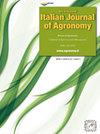Ultraviolet-C irradiation of wheat grains induces seedling resistance to leaf rust and powdery mildew disease
IF 2.1
3区 农林科学
Q1 AGRONOMY
引用次数: 0
Abstract
Ultraviolet-C (UV-C) irradiation of grains activated the antioxidant system and wheat seedlings’ resistance to leaf rust and powdery mildew disease under greenhouse conditions. Two wheat cultivars (Gemmeiza-12 and Sids-1) with dry and germinated grains were treated with UV-C at three exposure times (5, 10, and 15 minutes). The results indicated that the percentages of disease severity and infection type for leaf rust and powdery mildew on wheat seedlings were significantly reduced when exposed to UVC at all exposure times compared to the untreated control. The most effective treatments for both cultivars were obtained in seedlings grown from germinated grains treated with UV-C for 10 minutes. Furthermore, UV-C irradiation treatments improved plant resistance to infection by activating certain defense genes, thereby increasing the production of resistance compounds that support defense mechanisms against pathogens. Our results demonstrated that UV-C for 10 minutes can induce resistance in wheat seedlings while also increasing total chlorophyll, total phenolic compounds, phenylalanine ammonia-lyase, and peroxidase activity. In addition, phenylalanine ammonia-lyase mRNA expression levels were significantly increased in seedlings growing from germinated grains treated with UV-C for 10 minutes, as compared to both infected and uninfected controls. These findings demonstrate the potential for additional UV-C radiation treatments to enhance disease resistance.紫外- c辐射对小麦幼苗抗叶锈病和白粉病的影响
在温室条件下,小麦籽粒紫外辐射激活了抗氧化系统,提高了小麦幼苗对叶锈病和白粉病的抗性。对两个小麦品种(Gemmeiza-12和Sids-1)进行了5、10和15分钟的UV-C处理。结果表明,与未处理的对照相比,UVC对小麦幼苗叶锈病和白粉病的严重程度和感染类型百分比均有显著降低。UV-C处理10分钟后,两个品种的幼苗生长效果最好。此外,UV-C照射处理通过激活某些防御基因来提高植物对感染的抗性,从而增加抵抗化合物的产生,支持对病原体的防御机制。结果表明,UV-C处理10分钟可以诱导小麦幼苗产生抗性,同时增加总叶绿素、总酚类化合物、苯丙氨酸解氨酶和过氧化物酶活性。此外,与未感染和感染对照相比,经UV-C处理10分钟的发芽籽粒生长的幼苗中苯丙氨酸解氨酶mRNA表达水平显著增加。这些发现证明了额外的UV-C辐射治疗增强疾病抵抗力的潜力。
本文章由计算机程序翻译,如有差异,请以英文原文为准。
求助全文
约1分钟内获得全文
求助全文
来源期刊

Italian Journal of Agronomy
AGRONOMY-
CiteScore
4.20
自引率
4.50%
发文量
25
审稿时长
10 weeks
期刊介绍:
The Italian Journal of Agronomy (IJA) is the official journal of the Italian Society for Agronomy. It publishes quarterly original articles and reviews reporting experimental and theoretical contributions to agronomy and crop science, with main emphasis on original articles from Italy and countries having similar agricultural conditions. The journal deals with all aspects of Agricultural and Environmental Sciences, the interactions between cropping systems and sustainable development. Multidisciplinary articles that bridge agronomy with ecology, environmental and social sciences are also welcome.
 求助内容:
求助内容: 应助结果提醒方式:
应助结果提醒方式:


